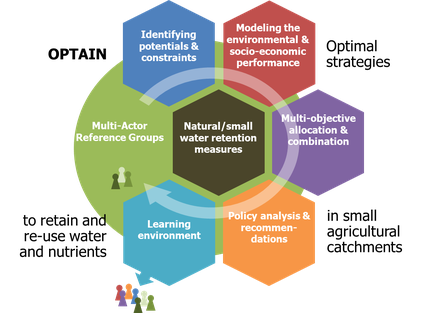Sustainable food security - OPTAIN

Introduction
OPtimal strategies to reTAIN and re-use water and nutrients in small agricultural catchments across different soil-climatic regions in Europe (OPTAIN) is a H2020 Societal Challenges programme that supports projects ensuring the sustainable management of land and waters by responding to the key challenges our planet is facing, such as safeguarding natural resources and adapting to and mitigating climate change. The project consists of 22 partners – mainly composed of universities and research institutions in 15 countries. OPTAIN is coordinated by the Helmholtz-Centre for Environmental Research in Germany spearheaded by Prof. dr. Martin Volk. The project runs from September 2020 to August 2025.
Project description
An increasing number of extreme events such as droughts and heavy rainfall exacerbate conflicts between agricultural water uses and other human and environmental demands for water. Natural/Small Water Retention Measures (NSWRMs) can help to mitigate those conflicts, addressing societal challenges such as climate change, biodiversity and food security at the same time. Despite the comprehensive set of water/nutrient retention measures available, knowledge is still lacking on the effectiveness of those measures across various European soil-climatic regions, agricultural systems, scales and especially under changing climate.
OPTAIN will enlarge the knowledge on natural/small water and nutrient retention and identify the controls of its effectiveness based on empirical data and scale-adapted integrated modelling at farm and catchment scale while considering all relevant components and processes of water and nutrient cycles.
OPTAIN will focus on 14 case studies across Continental (7), Pannonia (3) and Boreal (4) biogeographical regions including one Pannonia-Continental cross-border case. All case studies represent small catchments (4.5-250 km²) dominated by agricultural land use.
For each case study, OPTAIN will directly involve local actors, either as partners or stakeholders, who will have the twofold purpose of supporting the investigation and being the end-user of project results. The complementary expertise of consortium members, coupled with the operational knowledge of non-scientific local partners and stakeholders, will bring together a multidisciplinary and multi-actor approach. This will be enforced by the provision of a structured framework for stakeholders’ engagement and the establishment of a multi-actor reference group for each case study, to ensure site-specific coordinated actions, social acceptance and considering legal aspects of NSWRM.
Objectives
These are the objectives of OPTAIN:
- identify efficient techniques for the retention and reuse of water and nutrients in small agricultural catchments across Continental, Pannonian and Boreal biogeographical regions of Europe in close cooperation with local actors
- select NSWRMs at farm and catchment level and optimize their spatial allocation and combination, based on environmental and economic sustainability indicators.
- analyse current and future climate-change-related conflicts in water and nutrient management at farm and catchment level, as well as disentangling region-specific constraints and opportunities of past, present and novel NSWRM in agriculture and water management.
Role of Ghent University
Ghent University leads one of the case studies and contributes to several work packages.
Website
Contact
Prof. Peter Goethals
Department of Animal Sciences and Aquatic Ecology
Phone number: +32 9 264 37 68
E-mail